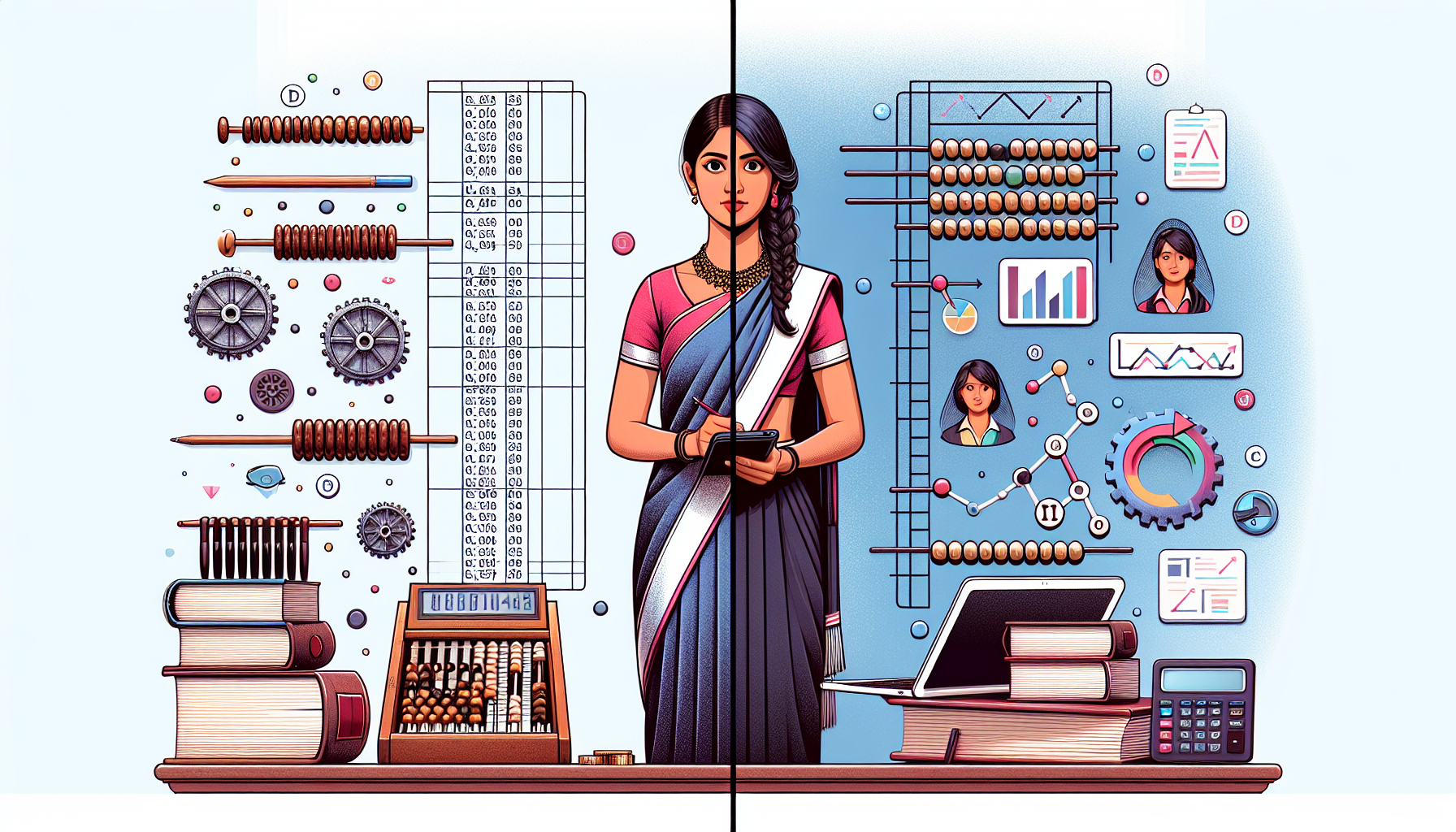Maximizing Efficiency: The Advantages of Modern Accounting Technology
Accounting technology is reshaping the business world. This article examines the tools and systems at the heart of this transformation. Discover how innovations like cloud computing, AI, and data analytics not only optimize accounting but also redefine the skills and roles within the profession. With real-world applications and expert insights, we’ll guide you through the essentials of accounting technology and its strategic importance to your business.
Key Takeaways
- Accounting technology has evolved from manual bookkeeping to advanced digital tools, integrating AI, RPA, and data analytics to automate tasks and provide strategic insights, significantly improving efficiency and accuracy in the field.
- Modern accounting practices heavily rely on cloud-based software, offering the flexibility of remote access, collaboration, scalability, data security, and real-time updates which are key in meeting the evolving demands of the profession.
- Adopting new accounting technologies comes with challenges such as resistance to change, implementation costs, and data security concerns, but these can be managed through effective change management and adhering to security regulations.
The Evolution of Accounting Technology

Accounting technology has evolved remarkably, transitioning from the early days of manual bookkeeping to continuous adoption of new technologies that refine practices. The advent of digital platforms was a game-changer, turning tedious tasks into streamlined processes.
Today, the role of technology in accounting is more pronounced than ever, with cloud computing and advanced technologies playing a pivotal role in shaping modern accounting practices.
From Paper to Digital
The accounting industry has been revolutionized by the transition from paper to digital, leading to:
- Enhanced accuracy
- Increased efficiency
- Streamlined processes
- Scalability
- Better data security
- Increased productivity
- Remote access to financial data
The digital revolution has not just made accountants’ work easier but also allowed for these benefits.
This shift has indeed been a boon for accounting professionals, providing them with tools to automate manual data entry and processing tasks, thereby saving significant time and reducing errors.
As a key component of the accounting landscape, cloud computing has emerged with prominence. This technology has offered a secure, accessible, and scalable solution for accounting professionals. With cloud-based accounting software, accountants can work securely from any location, provided they have an internet connection. Not only has this technology enabled agile working, but it has also allowed for real-time sharing of financial information and reports.
The flexibility offered by cloud computing has indeed revolutionized the way accountants work, leading to increased employee satisfaction and productivity.
Want to learn more about the cloud? Check out our blog post on how the cloud can benefit your business here!
Integration of Advanced Technologies

The industry has been further revolutionized by the integration of advanced technologies like AI, Robotic Process Automation (RPA), and data analytics into accounting systems. These technologies have automated complex and repetitive tasks, reducing the time and cost associated with manual processes. Furthermore, they have brought about a change in the way accountants work. Today’s accountants are not just number crunchers; they are strategic advisors who use predictive analytics to provide informed financial decisions and identify potential areas for company expansion.
The integration of these technologies has made the accounting profession more dynamic and exciting than ever before.
Key Components of Modern Accounting Technology

As more than just a digital version of paper-based systems, modern accounting technology offers numerous advantages. It comprises various components that work together to optimize accounting practices. Central to these are cloud-based software, automation and AI, and data analytics and visualization.
These components have revolutionized accounting, streamlining processes, enhancing efficiency, and enabling accountants to focus on tasks that add value to their businesses.
Cloud-Based Software
As a key component of modern accounting technology, cloud-based software holds significant importance. It offers:
- Flexibility and remote access, making it possible for accountants to work from anywhere, at any time.
- A platform for real-time collaboration, allowing accounting professionals to access and update financial data simultaneously.
- Ensures everyone is working with the most current information.
- Eliminates issues related to file sharing or version control, thereby streamlining communication and collaboration among accountants.
Automation and AI
The work of accountants has been transformed by automation and artificial intelligence. These technologies automate routine accounting tasks, freeing up accountants’ time to focus on more complex, value-adding tasks. Some examples of automation and AI in accounting include:
- Robotic Process Automation (RPA), which performs routine tasks autonomously, reducing the time spent on these and decreasing the likelihood of human error.
- Machine learning algorithms, which can analyze large amounts of financial data and identify patterns or anomalies.
- Natural language processing, which can extract relevant information from documents and automate data entry.
These advancements in technology have greatly improved the efficiency and accuracy of accounting processes, particularly in managing financial transactions.
By automating tasks, accountants can focus on strategic planning and advisory roles, enhancing the value they bring to their organizations.
Check out our blog post to learn more about the advantages of AI!
Data Analytics and Visualization
In modern accounting technology, data analytics and visualization tools hold a vital role in financial reporting. They enable accountants to analyze vast quantities of financial data, draw valuable insights, and make informed decisions. Furthermore, data visualization tools simplify complex data sets into easy-to-understand graphs, charts, and other visual formats, enabling accountants to efficiently assess information, recognize patterns, and identify anomalies.
These tools not only enhance decision-making but also facilitate effective communication of insights, making them indispensable for modern accounting practices and the analysis of financial statements.
The Impact of Accounting Technology on the Profession

Technology’s advent has profoundly impacted the accounting profession. It has not only transformed the way accountants work but also brought about changes in job roles and skill requirements. Moreover, the industry expectations are shifting, with clients demanding real-time access to financial information and personalized advisory services.
Evolving Job Roles
Job roles within the accounting profession have evolved due to the adoption of advanced technologies. Accounting professionals are now expected to:
- Handle large volumes of data
- Automate tasks
- Provide real-time insights
- Take on more strategic analysis and advisory responsibilities
Today’s accountants in accounting firms are moving away from conventional administrative roles and leveraging technology to meet these new expectations.
This shift in roles has indeed made the accounting profession more dynamic and rewarding.
New Skill Requirements
In the technology-driven environment, accountants are required to acquire new skills. Technological proficiency is now as important as understanding financial concepts. Accountants need to be adept at using data analytics tools and software.
In addition, they need to develop soft skills such as communication and critical thinking to effectively serve as business advisors.
Shifting Industry Expectations
As technology continues to shape the accounting industry, the expectations are shifting. Clients now demand real-time access to financial information and personalized advisory services. Accounting professionals are expected to stay abreast with the latest accounting technology trends and continually update their knowledge to meet these evolving expectations.
https://www.linkedin.com/pulse/role-technology-modern-accounting-practices-shawna-johnson/
Overcoming Challenges in Adopting Accounting Technology
Adoption of new accounting technology brings its own set of challenges. These include:
- Employee resistance
- High implementation costs
- Disruption of existing processes
- Concerns over data security and privacy
However, these challenges can be effectively managed through strategic change management and by addressing data security and privacy concerns.
Change Management
For successful technology adoption, change management is crucial. It involves managing the transition from existing systems to new ones. This can be achieved by:
- Setting clear goals
- Communicating effectively
- Providing training and support to employees
- Addressing resistance to change
Data Security and Privacy
When implementing new accounting technology, data security and privacy pose major concerns. Companies need to:
- Ensure that they comply with data security regulations and industry standards such as ISO 27002
- Take measures to protect data during the transition
- Ensure that the new technology provides robust data security and privacy protections.
Identifying the Right Accounting Technology for Your Needs
For the success of your business, it’s crucial to identify the right accounting technology for your needs. This involves assessing your current systems, comparing available solutions, and seeking expert advice.
By taking these steps, you can ensure that you choose the technology that best suits your business needs and helps you achieve your financial goals.
Interested in learning how to implement new technologies into your accounting practices? Check out our blog post here!
Assessing Your Current Systems
The first step in identifying the right accounting technology for your needs is to assess your current accounting systems. This involves evaluating the functionality of your existing system, identifying its strengths and weaknesses, and understanding your business needs.
By conducting a comprehensive assessment, you can identify areas for improvement and potential upgrades.
Comparing Available Solutions
After assessing your current systems, the subsequent step involves comparing available accounting technology solutions. This involves evaluating different solutions based on their features, scalability, and integration capabilities. By comparing different solutions, you can identify the one that best meets your business needs.
Seeking Expert Advice
Lastly, seeking expert advice should not be overlooked. Industry professionals and consultants can provide valuable insights and recommendations to help you choose the best accounting technology for your specific needs. They can guide you through the selection process, help you understand the implications of different technologies, and provide support during the implementation phase.
If you are looking to implement a new ERP or accounting package, check out this video on 4 steps to follow for software migrations.
Case Studies: Successful Implementation of Accounting Technology
Examining some case studies of successful implementation can provide a better understanding of the impact of accounting technology. These stories demonstrate how both small businesses and large enterprises have benefited from the adoption of modern accounting technology.
Small Business Success Story
For small businesses, the adoption of modern accounting technology has been a game-changer. By leveraging tools like blockchain, automation, and AI-powered bookkeeping products, small businesses have been able to streamline operations, enhance efficiency, and drive growth.
A prime example of this is the success story of a small business that adopted popular software like QuickBooks, Xero, and Zoho Books, resulting in enhanced financial forecasting and better client relationship management.
Large Enterprise Transformation
Through the adoption of advanced technology, large enterprises have also transformed their accounting practices. By implementing technologies like:
- Cloud technology
- AI and machine learning
- Big data
- Real-time analytics
- IoT
- AR
These enterprises have been able to streamline processes, enhance collaboration, and drive innovation across the organization.
Prominent examples include Amazon, Starbucks, and Toyota, all of which have effectively integrated accounting technology to enhance their business operations.
Summary
In conclusion, the rise of technology has revolutionized the accounting profession. From streamlining processes and enhancing accuracy to enabling real-time access to financial data and fostering informed decision-making, technology has transformed the way accountants work. While the adoption of new technology comes with its own set of challenges, with effective change management and a focus on data security and privacy, these challenges can be overcome. As the case studies have shown, both small businesses and large enterprises can benefit from the adoption of modern accounting technology. As we look ahead, it is clear that technology will continue to shape the future of the accounting profession, making it a more dynamic, efficient, and rewarding field.
Frequently Asked Questions
What is modern technology in accounting?
Modern technology in accounting involves the use of computerized systems to track and record financial transactions, replacing manual methods with faster and more accurate processes.
How technology will change accounting?
In the future, accounting will see a greater adoption of sophisticated technologies such as AI, automation, and data analytics, enhancing productivity and reinforcing the need for accountants to improve their soft skills. These advancements will undoubtedly revolutionize the accounting industry.
What are at least three common technologies used within the accounting pathway?
Common technologies used in the accounting pathway include accounting software, spreadsheet applications, and enterprise resource planning (ERP) systems. These technologies help to streamline financial processes and improve decision-making.
What are the challenges in adopting accounting technology?
Adopting accounting technology poses challenges such as employee resistance, high implementation costs, process disruption, and data security and privacy concerns. These factors need to be carefully considered and addressed in the adoption process.
What are the benefits of adopting modern accounting technology for small businesses?
Adopting modern accounting technology can help small businesses streamline operations, enhance efficiency, drive growth, and facilitate better decision-making.







